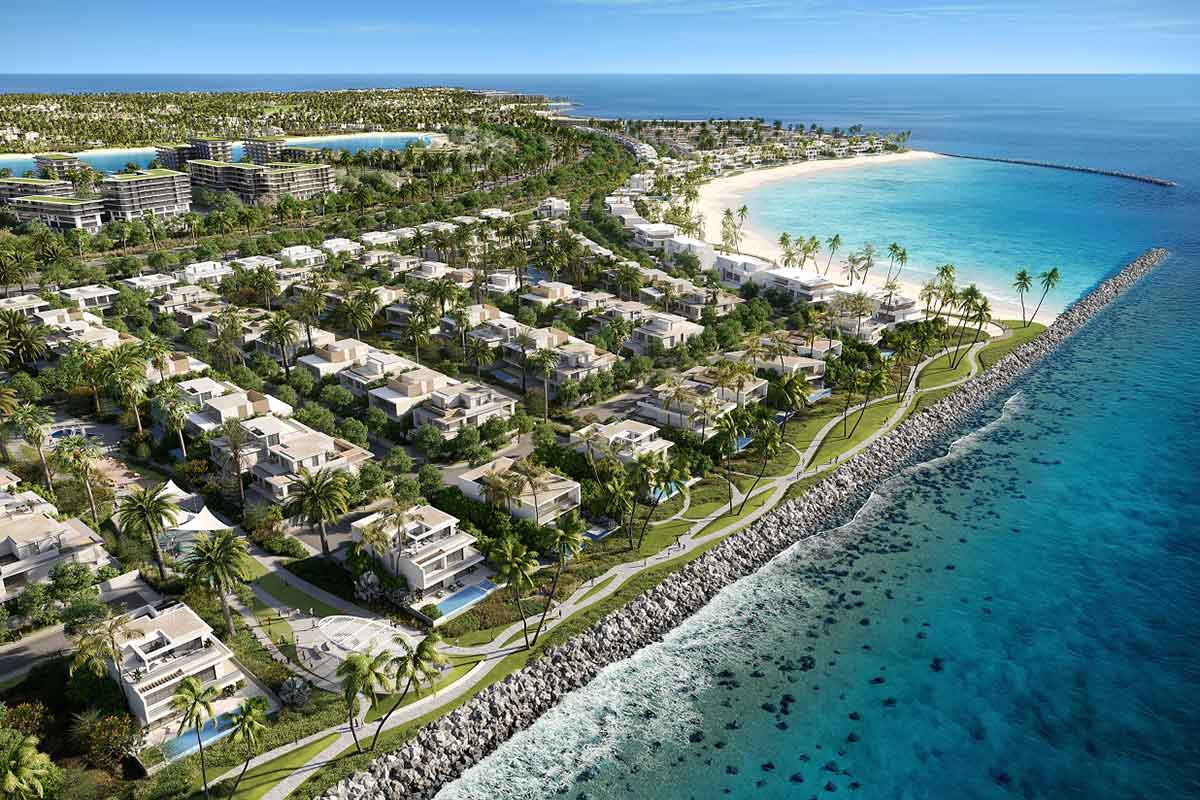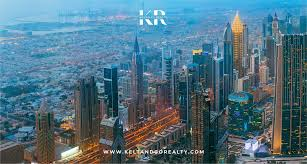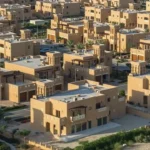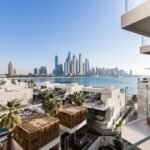Now Reading: Island Real Estate in Dubai: Tax Planning Tips for High-Net-Worth Buyers
-
01
Island Real Estate in Dubai: Tax Planning Tips for High-Net-Worth Buyers
Island Real Estate in Dubai: Tax Planning Tips for High-Net-Worth Buyers

Table of Contents
Imagine hosting a sunset dinner on your Palm Jumeirah villa’s terrace, the Arabian Gulf glistening below, knowing your investment is optimized for minimal tax exposure. For high-net-worth buyers in 2025, Dubai’s island developments Palm Jumeirah, Palm Jebel Ali, and the 17-square-kilometer Dubai Islands offer a blend of luxury and tax efficiency unmatched globally.
With 100% freehold ownership, a dirham pegged to the U.S. dollar for stability, and no personal income tax, capital gains tax, or annual property taxes for individuals, these islands attract 58% of buyers from countries like the UK, India, and Russia, driving 94,000 property transactions in the first half of 2025. Offering 4-6% rental yields and 8-15% price appreciation, they outshine London (2-4%) or New York (3-4%).
Properties over $545,000 qualify for a 10-year Golden Visa, while smaller units offer 2-year residency perks. Residential purchases dodge 5% VAT, but high-net-worth buyers, often using corporate structures or funds, face unique tax considerations. This guide offers tailored tax planning tips for projects like Palm Jumeirah Ocean Villas, Palm Jebel Ali Coastal Villas, Dubai Islands Horizon Villas, Haven Living, and Azura Residences, ensuring your wealth thrives.
Why Dubai’s Islands Are a Tax Haven for the Elite
Spanning iconic waterfronts 15-30 minutes from Dubai International Airport via Sheikh Zayed Road or water taxi, Palm Jumeirah, Palm Jebel Ali, and Dubai Islands boast 50-80 kilometers of coastline, exclusive amenities, and low 2-3% vacancy rates compared to 7-10% globally, fueled by 25 million tourists and a 5% population surge.
High-net-worth buyers keep 100% of rental income ($80,000-$240,000 annually on a $2 million-$6 million property), versus $44,000-$144,000 elsewhere after taxes. Zero capital gains tax saves $100,000-$280,000 on a $500,000-$1 million profit, and no annual property taxes save $20,000-$120,000 yearly, unlike New York (1-2%) or London (council tax up to 2%). Residential purchases avoid 5% VAT ($100,000-$300,000), but corporate structures, common among wealthy buyers, require strategic planning to minimize taxes like the 9% corporate tax or new 2025 rules.
The tax-light allure feels like a golden opportunity for your portfolio.
No Personal Income Tax: Maximizing Rental Returns
Holding properties personally ensures zero personal income tax, a game-changer compared to the U.S. (up to 37%) or UK (up to 45%). A $4 million Palm Jumeirah villa yielding $160,000-$240,000 annually keeps every dirham, versus $88,000-$144,000 elsewhere, saving $72,000-$96,000. A $2 million Haven Living apartment on Dubai Islands yielding $80,000-$120,000 saves $36,000-$48,000.
Long-term leases require Ejari registration ($54-$136 annually), while short-term rentals, boosted by 25 million tourists, need DTCM registration ($408-$816). Palm Jumeirah’s tourist appeal boosts short-term yields by 15-20% ($24,000-$48,000), while Dubai Islands’ newer projects offer 10-15% ($8,000-$36,000). For high-net-worth buyers, short-term rentals maximize returns, but VAT registration is key if revenue exceeds $102,041.
Tax-free rentals feel like a steady stream fueling your wealth.
Zero Capital Gains Tax: Protecting Your Profits
Dubai’s zero capital gains tax lets you keep 100% of sale profits. Selling a $4 million Palm Jebel Ali villa for $5 million after 25% appreciation yields a $1 million tax-free profit, saving $200,000-$280,000 compared to London (20-28%) or New York (20-37%).
A $2 million Azura Residences apartment sold for $2.5 million yields a $500,000 tax-free gain, saving $100,000-$140,000. Price growth varies: Palm Jumeirah at 8-12%, Palm Jebel Ali at 10-15% due to limited supply, and Dubai Islands at 8-12%. High-net-worth buyers benefit by timing sales to capitalize on these gains, avoiding transfer fee surprises.
Keeping every dirham feels like a victory for your legacy.
No Annual Property Taxes: Lowering Ownership Costs
Unlike global markets where annual property taxes cost $20,000-$120,000 on a $2 million-$6 million property, Dubai imposes none, a major draw for high-net-worth buyers. Maintenance fees vary: $15,000-$25,000 for Palm Jumeirah’s luxury villas, $12,000-$20,000 for Palm Jebel Ali’s eco-friendly designs, and $5,000-$14,000 for Dubai Islands’ newer projects. A 5% municipality fee on rentals ($4,000-$12,000) applies, with Palm Jumeirah’s premium amenities driving higher fees. Budget-conscious buyers may prefer Dubai Islands’ lower maintenance costs, while Palm Jumeirah suits those prioritizing prestige.
No property taxes feel like a weight lifted from your investment.
VAT Exemption: A Core Benefit with Planning Needs
Residential purchases across all islands are VAT-exempt, saving $100,000-$300,000 on a $2 million-$6 million property, unlike commercial properties or the UK’s stamp duty (up to 12%). Off-plan purchases, common in Palm Jebel Ali and Dubai Islands, incur 5% VAT on developer fees ($20,000-$80,000), recoverable via Federal Tax Authority (FTA) registration ($500-$1,000). High-net-worth buyers operating short-term rentals must register for VAT if revenue exceeds $102,041, charging 5% but claiming credits on expenses like DTCM fees ($408-$816). A $4 million Palm Jumeirah villa yielding $160,000-$240,000 incurs $8,000-$12,000 in VAT but allows $2,000-$5,000 in credits. Non-compliance risks fines up to $13,612, so hire a tax advisor ($1,000-$3,000) to ensure recovery and compliance.
The VAT exemption feels like a warm handshake, but planning is key.
Transfer Fees: Planning for Upfront Costs

Transfer fees are a primary cost for high-net-worth buyers. The 4% Dubai Land Department (DLD) fee, split unless negotiated, costs $80,000 for a $2 million Azura Residences apartment or $160,000 for a $4 million Palm Jumeirah villa. Broker fees, typically 2% ($40,000-$80,000), may be waived for off-plan projects in Dubai Islands.
Title deed issuance ($136-$272) and developer fees for off-plan properties (up to $2,722) vary, with Palm Jebel Ali and Dubai Islands facing higher fees due to ongoing construction. Gift transfers to family or shareholders reduce DLD to 0.125% ($2,500-$5,000), saving $77,500-$155,000. Mortgage registration (0.25% of the loan) and valuation fees ($680-$1,360) apply for financed deals. Flexible payment plans (35/65) in Dubai Islands ease cash flow compared to Palm Jumeirah’s 60/40 plans.
Transfer fees feel like a tailored step toward elite ownership.
Corporate Tax: Navigating Business Structures
High-net-worth buyers often use corporate entities, triggering the 9% corporate tax unless exempt. A company leasing a $4 million property yielding $160,000-$240,000 faces a 9% tax ($14,400-$21,600), reducing net income to $145,600-$218,400. Qualified Free Zone Person (QFZP) status in areas like Dubai Multi Commodities Centre (DMCC) avoids this, saving $20,400-$61,200, with setup costs of $2,000-$5,000. Small business relief waives corporate tax for revenues under $816,000 until December 31, 2026. Individual ownership avoids this tax, ideal for most high-net-worth buyers, but corporate structures require QFZP planning.
Corporate taxes feel like a navigable hurdle for savvy investors.
New Tax Rule 1: Domestic Minimum Top-up Tax (DMTT)
Effective January 1, 2025, the DMTT imposes a 15% tax on multinational enterprises (MNEs) with global revenues over €750 million ($793 million). A corporate entity leasing 10 properties with $1 million in income faces a 15% tax ($150,000), reducing net income to $850,000. Individual buyers and smaller entities with revenues below $816,000 are unaffected, and QFZP status avoids DMTT, saving $12,240-$61,200 on $122,400-$612,000 in income. High-net-worth buyers using global entities must ensure QFZP compliance to maintain tax efficiency.
The DMTT feels like a corporate tweak, sparing individual wealth.
New Tax Rule 2: Qualifying Investment Fund (QIF) Updates
Cabinet Decision No. 34 of 2025, effective Q2 2025, refines QIF and Real Estate Investment Trust (REIT) rules. QIFs remain exempt from corporate tax if real estate income is below 10% of total income and ownership is diversified. If a QIF earns $1 million, with $200,000 from real estate, 80% ($160,000) faces 9% tax ($14,400). Restructuring costs $1,500-$4,000. Individual buyers avoid these rules, but high-net-worth investors using funds must structure portfolios to minimize tax exposure.
QIF updates feel like a strategic puzzle for elite portfolios.
Palm Jumeirah Ocean Villas: Prestige with Tax Efficiency
Palm Jumeirah Ocean Villas by Nakheel, set for completion in Q2 2025, offer 4-6 bedroom villas ($3 million-$6 million) with 4-6% rental yields and 8-12% price growth. A $4 million villa yields $160,000-$240,000 tax-free, saving $72,000-$96,000. Selling for $5 million yields a $1 million tax-free profit, saving $200,000-$280,000. No property taxes save $40,000-$80,000 yearly, and VAT exemption saves $200,000. Transfer costs include a 4% DLD fee ($120,000-$240,000), 2% broker fee ($60,000-$120,000), and title deed issuance ($136-$272). Gift transfers save $118,750-$237,500. Maintenance fees are $15,000-$25,000, with a 5% municipality fee ($8,000-$12,000). QFZP saves $40,800-$61,200. U.S. investors deduct depreciation ($72,727-$109,091), saving up to $36,364. Golden Visa eligibility applies.
The beachfront prestige feels like a tax-efficient masterpiece.
Palm Jebel Ali Coastal Villas: Eco-Friendly Tax Savings
Palm Jebel Ali Coastal Villas by Nakheel, set for completion in Q3 2025, offer 4-6 bedroom villas ($2.72 million-$5.44 million) with 4-6% rental yields and 10-15% price growth. A $3 million villa yields $120,000-$180,000 tax-free, saving $54,000-$72,000. Selling for $3.75 million yields a $750,000 tax-free profit, saving $150,000-$210,000. No property taxes save $30,000-$60,000 yearly, and VAT exemption saves $150,000.
Transfer costs include a 4% DLD fee ($108,900-$217,800), 2% broker fee ($54,450-$108,900), and title deed issuance ($136-$272). Gift transfers save $106,650-$213,300. Maintenance fees are $12,000-$20,000, with a 5% municipality fee ($6,000-$9,000). QFZP saves $30,600-$45,900. U.S. investors deduct depreciation ($54,545-$98,182), saving up to $34,091. Golden Visa eligibility applies.
The eco-friendly charm feels like a tax-smart retreat.
Dubai Islands Horizon Villas: Modern Tax-Light Haven
Horizon Villas by a leading developer, set for completion in Q2 2026, offer 4-6 bedroom villas ($2.72 million-$5.44 million) with 4-6% rental yields and 8-12% price growth. A $3 million villa yields $120,000-$180,000 tax-free, saving $54,000-$72,000. Selling for $3.75 million yields a $750,000 tax-free profit, saving $150,000-$210,000. No property taxes save $30,000-$60,000 yearly, and VAT exemption saves $150,000. Transfer costs include a 4% DLD fee ($108,900-$217,800), 2% broker fee ($54,450-$108,900), and title deed issuance ($136-$272). Gift transfers save $106,650-$213,300. Maintenance fees are $12,000-$20,000, with a 5% municipality fee ($6,000-$9,000). QFZP saves $30,600-$45,900. U.S. investors deduct depreciation ($54,545-$98,182), saving up to $34,091. Golden Visa eligibility applies.
The waterfront serenity feels like a modern tax-light gem.
Haven Living: Affordable Tax Efficiency
Haven Living by Metac Properties, set for completion in Q4 2025, offers 1-3 bedroom apartments ($475,750-$1.2 million) with 4-6% rental yields and 8-12% price growth. A $1.2 million apartment yields $48,000-$72,000 tax-free, saving $21,600-$28,800. Selling for $1.5 million yields a $300,000 tax-free profit, saving $60,000-$84,000.
No property taxes save $12,000-$24,000 yearly, and VAT exemption saves $60,000. Transfer costs include a 4% DLD fee ($48,000), 2% broker fee ($24,000), and title deed issuance ($136-$272). Gift transfers save $46,500. Maintenance fees are $5,000-$10,000, with a 5% municipality fee ($2,400-$3,600). QFZP saves $12,240-$18,360. U.S. investors deduct depreciation ($21,818-$43,636), saving up to $17,455. Golden Visa eligibility applies for properties over $545,000.
The waterfront charm feels like a budget-friendly tax haven.
Azura Residences: Urban Tax-Free Retreat
Azura Residences by Invest Group Overseas, set for completion in Q2 2026, offers 1-4 bedroom apartments ($680,625-$2 million) with 4-6% rental yields and 8-12% price growth. A $2 million apartment yields $80,000-$120,000 tax-free, saving $36,000-$48,000. Selling for $2.5 million yields a $500,000 tax-free profit, saving $100,000-$140,000.
No property taxes save $20,000-$40,000 yearly, and VAT exemption saves $100,000. Transfer costs include a 4% DLD fee ($80,000), 2% broker fee ($40,000), and title deed issuance ($136-$272). Gift transfers save $77,500. Maintenance fees are $6,000-$12,000, with a 5% municipality fee ($4,000-$6,000). QFZP saves $20,400-$30,600. U.S. investors deduct depreciation ($36,364-$72,727), saving up to $24,545. Golden Visa eligibility applies.
The urban waterfront feels like a sleek tax-free oasis.
Tax Planning Strategies for High-Net-Worth Buyers
For individuals: First, hold properties personally to avoid corporate taxes. Second, negotiate DLD fee splits, saving $40,000-$120,000 on a $2 million-$6 million property. Third, use gift transfers to reduce DLD to 0.125%, saving $77,500-$237,500. Fourth, recover 5% VAT on developer fees via FTA registration ($500-$1,000).
Fifth, leverage double taxation treaties with 130+ countries to avoid foreign taxes. Sixth, U.S. investors deduct depreciation ($36,364-$109,091) and management fees ($2,400-$14,545), saving up to $36,364. For corporates: First, obtain QFZP status to avoid 9% tax and DMTT, saving $20,400-$61,200. Second, keep QIF income below 10%. Third, use small business relief until 2026. Hire a property manager ($5,000-$25,000 annually) and tax professionals ($1,000-$3,000) to avoid fines up to $136,125. Focus on short-term rentals in Palm Jumeirah for higher yields or long-term leases in Dubai Islands for stability.
These strategies feel like a blueprint for elite tax efficiency.
Ongoing Costs Beyond Taxes
Maintenance fees range from $5,000-$25,000, with Palm Jumeirah at the high end and Dubai Islands lower. A 5% municipality fee on rentals ($2,400-$12,000) applies. No annual property taxes save $20,000-$120,000 yearly. Short-term rentals boost yields by 10-20%, adding $8,000-$48,000, but require DTCM registration ($408-$816). Mortgage interest deductions for U.S. investors save up to $36,364. These low costs, compared to London’s council tax ($40,000-$120,000), favor Dubai Islands for cost-conscious buyers.
Ongoing costs feel like a gentle breeze compared to global markets.
Navigating Risks in 2025
A projected oversupply of 41,000 units may slow price growth, with Palm Jumeirah less affected due to its prestige. Mitigate by choosing trusted developers like Nakheel, verifying escrow compliance under the 2025 Oqood system, and targeting low-vacancy projects (2-3%). Ensure QFZP and VAT compliance to avoid fines. Palm Jumeirah’s short-term rentals leverage tourists, while Palm Jebel Ali and Dubai Islands suit long-term leases. Proximity to key hubs drives value.
Why Dubai’s Islands Are a Wealthy Buyer’s Dream
Palm Jumeirah Ocean Villas, Palm Jebel Ali Coastal Villas, Horizon Villas, Haven Living, and Azura Residences offer no personal income tax, capital gains tax, or property taxes, saving $20,000-$280,000 annually. With 4-6% yields, 8-15% price growth, and Golden Visa perks, these 2025 projects make Dubai’s islands a luxurious, tax-efficient haven for high-net-worth buyers who plan strategically.
read more: Buying Property in Dubai as a Foreigner: Full Tax Breakdown 2025






















